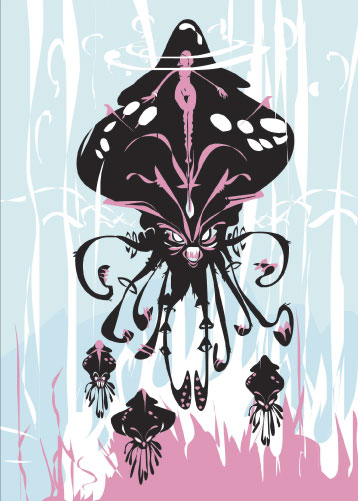"THE BEAR:" A Poem About Squid

"The Bear"
When my propane ran out
when I was gone and the food
thawed in the freezer I grieved
over the five pounds of melted squid,
but then a big gaunt bear arrived
and feasted on the garbage, a few tentacles
left in the grass, purplish white worms.
O bear, now that you've tasted the ocean
I hope your dreamlife contains the whales
I've seen, that the one in the Humboldt current
basking on the surface who seemed to watch
the seabirds wheeling around her head.
-- Jim Harrison
Now, this is a GREAT EXAMPLE of how I want you ladies to learn to read a poem. NEVER MIND the onomatopoeia, the meter and the blank verse format.
Narrative Structure: Mammal ingests aquatic creature and may or may not be changed as a result.
Narrator: Possessor of calamari and piscatorial consciousness, hoping to pass that on to the next creature that comes along.
Subjunctive motivation: It sure would have been sad to see that squid go to waste, but it didn't turn out that way, now did it? Happy ending.
POV: Obviously a recruiter looking to add mammals to the Piscatorial Collective.
Implied doubt: The recruiting effort may or may not pan out. The narrator, like any of us, can only hope that the bear gets the message.
Lyrical Focus: A poor, starving land animal that could learn to think more about THE OCEAN in order to enrich its sorry life.
Poet: "Jim Harrison" is the phoniest, made-up-sounding, overly-unobtrusive pen name imaginable. Which suggests strongly to me that the author is some sort of Blenny.
DO I SMELL OPERATIVE?
IMPORTANT NOTE TO MY READERS: This was sent by a Four Corners operative who did not give the full citation for this poem. This may be the effect of the desert heat on what is, after all, a fish. But I have no such excuse, being comfortably ensconced hundreds of feet below the Manoogian Mansion on a seventy-degree day after a nice rain. With that said, my web-fu remains weak and foolish: I cannot find the entire text of the poem or the publishing information. This might be only a third of the piece, or it could have been mangled in transmission from there to here. If the text is not correct, I apologize, and until I can get the rest of it I apologize for not having the complete citation.
When my propane ran out
when I was gone and the food
thawed in the freezer I grieved
over the five pounds of melted squid,
but then a big gaunt bear arrived
and feasted on the garbage, a few tentacles
left in the grass, purplish white worms.
O bear, now that you've tasted the ocean
I hope your dreamlife contains the whales
I've seen, that the one in the Humboldt current
basking on the surface who seemed to watch
the seabirds wheeling around her head.
-- Jim Harrison
Now, this is a GREAT EXAMPLE of how I want you ladies to learn to read a poem. NEVER MIND the onomatopoeia, the meter and the blank verse format.
Narrative Structure: Mammal ingests aquatic creature and may or may not be changed as a result.
Narrator: Possessor of calamari and piscatorial consciousness, hoping to pass that on to the next creature that comes along.
Subjunctive motivation: It sure would have been sad to see that squid go to waste, but it didn't turn out that way, now did it? Happy ending.
POV: Obviously a recruiter looking to add mammals to the Piscatorial Collective.
Implied doubt: The recruiting effort may or may not pan out. The narrator, like any of us, can only hope that the bear gets the message.
Lyrical Focus: A poor, starving land animal that could learn to think more about THE OCEAN in order to enrich its sorry life.
Poet: "Jim Harrison" is the phoniest, made-up-sounding, overly-unobtrusive pen name imaginable. Which suggests strongly to me that the author is some sort of Blenny.
DO I SMELL OPERATIVE?
IMPORTANT NOTE TO MY READERS: This was sent by a Four Corners operative who did not give the full citation for this poem. This may be the effect of the desert heat on what is, after all, a fish. But I have no such excuse, being comfortably ensconced hundreds of feet below the Manoogian Mansion on a seventy-degree day after a nice rain. With that said, my web-fu remains weak and foolish: I cannot find the entire text of the poem or the publishing information. This might be only a third of the piece, or it could have been mangled in transmission from there to here. If the text is not correct, I apologize, and until I can get the rest of it I apologize for not having the complete citation.


1 Comments:
ooh! I have been waiting for a freash entry here - and it turns out to be the poem I sent out!
I hadn't realized all its worth until your analysis.
I got the poem via the daily writer's almanac, so I believe it is complete.
Post a Comment
<< Home